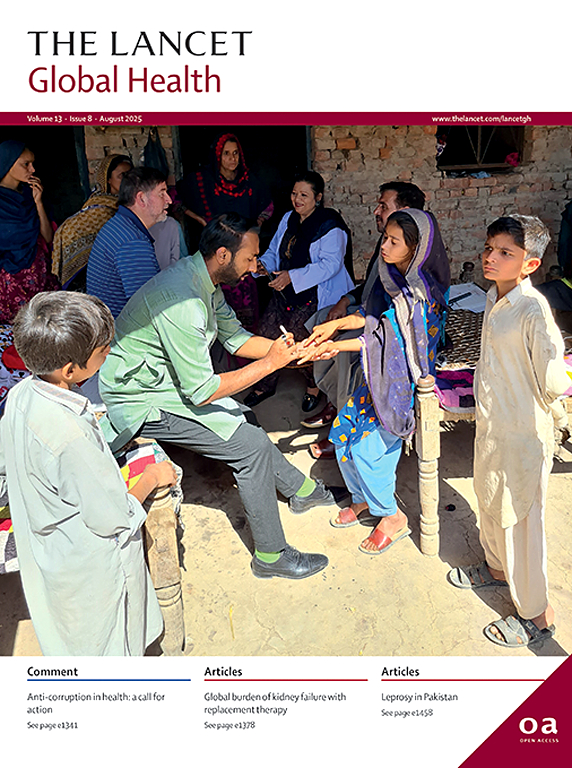Corruption—commonly defined as the abuse of entrusted power for private gain—is a pervasive threat to health, health systems, and societies worldwide.1
Corruption compounds inequities, disproportionately harms marginalised populations, and undermines the right to health and the health system by diverting resources from their intended purpose and limiting access to essential services.
Studies have linked corruption to higher child and adult mortality,2,3 increased frequency of infectious diseases and antimicrobial resistance,4 and mental ill health.5
Corruption has also been associated with reduced immunisation coverage,6 worsened access to primary health care,7 and the circulation of substandard and falsified medical products.8
Although comprehensive estimates are unavailable, the cost—in lives and in money—is undoubtedly immense.
Motivations for corrupt behaviour range from the need to survive in dysfunctional systems to greed.
Corruption thrives in situations with weak oversight and poorly enforced rules.
Health workers might solicit informal payments, steal supplies, or be absent from duty. Procurement processes can be opaque and manipulated, leading to shortages of essential medicines and equipment.
Health budgets can be lost to billing fraud and corrupt contracting.
Progressive policy makers often face opposition from those whose interests are threatened.9
In these ways, trust is eroded among patients, providers, and institutions, and those who have no alternatives suffer the most.
Corruption can affect countries at every income level.
High-income countries have experienced major corruption scandals, such as during the COVID-19 pandemic.10
These same countries are often complicit in enabling global corruption by hosting financial institutions and tax havens that allow illicit profits to be hidden.
Despite decades of reform, anti-corruption efforts have had limited success.11
Most initiatives emphasise transparency and legal enforcement, yet overlook deeper institutional and political drivers.
Focusing solely on sanctioning individuals fails to address underlying systemic incentives and structural weaknesses,1 many of which originate from outside of the health sector.
Tackling corruption effectively, therefore, requires engaging with the broader political economy.
The need for action has never been more urgent.
Recent geopolitical shifts have introduced new uncertainties in global health governance and sent shockwaves through the international health system.
These shifts coincide with increased defence spending and potential cuts to aid budgets by traditional donor countries.
Governments of countries that have received aid and face fiscal constraints should now mobilise domestic resources with greater efficiency and integrity.
In an era of constrained financing, the imperative to spend money wisely has never been stronger.
The Lancet Global Health has called for a decade of anti-corruption.
Reaching this goal will require more than political will, demanding tools, solutions based on evidence and circumstance, and strategies to dismantle the structural roots of corruption.
The Lancet Global Health Commission on anti-corruption in health will respond to this challenge with a novel approach.
Corruption is not merely a moral failure but a deeply embedded structural issue that requires evidence-based, context-specific solutions.
We recognise that health systems are shaped by both formal rules and by informal networks, kinship ties, and political allegiances.
Tackling corruption could involve high political and practical costs and might even worsen conditions in the short term.
The Commission will move beyond punitive approaches to champion pragmatic, politically realistic solutions that build trust, strengthen institutions, and drive progress towards universal health coverage.
The Commission will highlight the mechanisms linking corruption to health outcomes, making it harder for policy makers to ignore root causes.
We will examine how governance structures, labour rights, and economic conditions interact with health policy.
Our recommendations will address the incentives facing actors at every level—from rural clinics to global financial hubs—and promote the role of civil society in holding power to account.
We will identify the opportunities that prompt actors to engage in corruption and will propose ways to strengthen appropriate checks and balances in health systems and beyond.
Health institutions need to embed safeguards and early warning mechanisms to foster integrity and resilience.
Addressing low pay and poor working conditions is crucial to curbing misconduct driven by desperation.
Above all, proposed measures should consider unintended consequences, including the misuse of anti-corruption policies to target political opponents.
Our commissioners, drawn from diverse backgrounds, will rely on evidence synthesis, exemplar case studies (especially those that have had demonstrable results), and extensive stakeholder consultations. By engaging policy makers, health workers, civil society, and researchers, we aim to ensure that our recommendations are practical and adaptable across all contexts.
This approach will support stakeholders in navigating political realities and implementing effective, evidence-informed responses to corruption.
We will measure our success not by the publication of a report, but by the movement we want to spark—a movement that catalyses sustained action, fosters accountability and resilience, and ensures that health resources reach those who need them most.
Competing Interests
We declare no competing interests.
We acknowledge David Clarke’s contributions to conceptualising the Lancet Global Health Commission on anti-corruption in health by providing advice and recommendations on how to integrate anti-corruption, transparency, and accountability measures into health system strengthening efforts.
We acknowledge the commissioners (Andre Carletto, Jonathan Cushing, Walter Flores, Monica Kirya, Keith Martin, Obinna Onwujekwe, Ulana Suprun, Girija Vaidyanathan, Taryn Vian), who have provided insights and inputs into shaping the main arguments of the Lancet Global Health Commission on anti-corruption. Julia Sallaku and Kalipso Chalkidou helped to shape the planned work of the Commission.
This piece has the support of and is in collaboration with the European Observatory on Health Systems and Policies.
source: https://www.thelancet.com/journals/langlo/article/PIIS2214-109X(25)00215-3/fulltext?rss=yes

